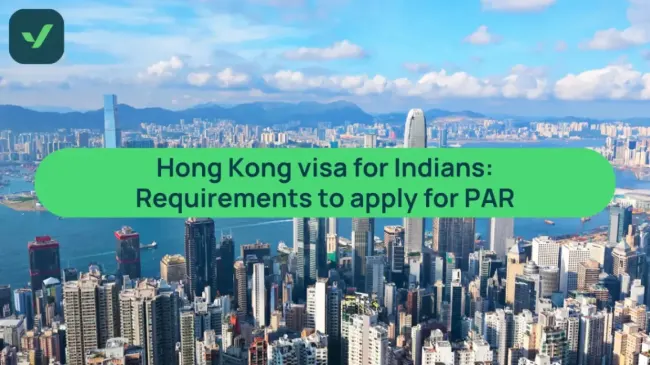
Hong Kong
Welcome to Hong Kong
Thinking about whether you need a visa for your upcoming trip to Hong Kong? You've come to the right place. This blog is designed to guide you through the visa process, helping you understand whether you require a visa and identifying the appropriate visa based on your travel intentions.

What's a Hong Kong Pre-arrival Registration, and who's it for?
Who's the Hong Kong Pre-arrival Registration for?
Hong Kong's Pre-arrival Registration (PAR) system is specifically for Indian nationals. It's a system set up to let people from India visit Hong Kong without needing a traditional visa for short stays.
What's the purpose of a Hong Kong Pre-arrival Registration?
To make entering Hong Kong as smooth as possible for Indian nationals. It's meant for short visits, like tourism or business trips, allowing travelers to skip the visa process for quick stays.
How long can you stay with a Hong Kong Pre-arrival Registration?
After your registration is approved, you can use it to enter Hong Kong multiple times for six months from the issue date. Each time you enter, you can stay for up to 14 days.
What's a Hong Kong Visit Visa, and who's it for?
Who's the Hong Kong Visit Visa for?
Travelers who aren't eligible for visa-free entry or the Pre-arrival Registration available to Indian nationals. This includes travelers from countries that don't have visa exemption agreements with Hong Kong, like Afghanistan, Iran, Myanmar, Vietnam and more.
Who's not eligible for a Hong Kong Visit Visa?
Individuals from more than 150 countries and territories can enter Hong Kong without a visa for stays ranging from 7 to 180 days, depending on their nationality. This includes Argentina, Australia, Belgium, Egypt, Spain, the USA, and more.
Do you need to apply for a Hong Kong Visit Visa? Use the Visa Checker Tool to find out.
What's the purpose of a Hong Kong Visit Visa?
-
Tourism.
-
Visit family and friends residing in the city.
-
Engage in short-term business activities, like attending meetings or conferences.
However, it's not meant for long-term stays, employment, or study. For those activities, different types of visas and permits are required.
How long can you stay with a Hong Kong Visit Visa?
The tourist visa is valid for 15, 30, or 90 days, and it can be issued for single or multiple entries. The validity period is determined by the immigration officer processing your application.
What's a Hong Kong Transit Visa, and who's it for?
Who's the Hong Kong Transit Visa for?
Travelers who need to pass through Hong Kong on their way to another destination but can't benefit from visa-free transit privileges.
What's the purpose of a Hong Kong Transit Visa?
It's useful for:
-
Those who need to change airports in Hong Kong.
-
Travelers with layovers longer than 24 hours.
-
Anyone wanting to leave the airport during their transit, perhaps to explore the city for a short while.
How long can you stay with a Hong Kong Transit Visa?
The Hong Kong Transit Visa typically allows a short stay, usually just enough to cover your layover period until your next flight. While the exact duration can vary, it's generally granted to match your travel itinerary.
What are Hong Kong's long-term visa options, and who are they for?

Whether you're looking to work, study, reunite with your family, or make Hong Kong your new home, the city offers several long-term visa options to suit a variety of needs. Let's take a look at some common long-term visas available.
-
Work visa: For professionals who have a job offer in Hong Kong in a specialized field. To be eligible, you generally need relevant qualifications and experience that aren't readily available in Hong Kong.
-
Student visa: If you're planning to pursue your studies in Hong Kong, this is the visa you need.
-
Dependant visa: Allows the spouse and dependent children under the age of 18 of someone who's already legally allowed to work or study in Hong Kong to join them.
-
Residence visa: For those seeking to make Hong Kong their permanent home. It's available through numerous routes, including the Quality Migrant Admission Scheme for highly skilled or talented individuals, and the Investment as Entrepreneurs route for those willing to contribute substantially to the economy.
It's important to note that we don't handle these long-term visa applications. For the most accurate and up-to-date information, including details on how to apply, you can check the Hong Kong Immigration Department website.
Staying healthy in Hong Kong: Here's what you need to know
Hong Kong has a robust healthcare system catering to a range of medical needs. Whether you're visiting for a short trip or planning a longer stay, knowing how to navigate the healthcare landscape is key to a worry-free visit. Let's dive into the essentials.
Make sure to stay updated on routine vaccines
Ensure that vaccinations such as measles-mumps-rubella (MMR), diphtheria-tetanus-pertussis, varicella (chickenpox), polio, and your yearly flu shot are up-to-date before traveling.
Travelers are often recommended to consider the following vaccines:
-
Hepatitis A: Recommended for most travelers due to the possibility of exposure through food or water in Hong Kong.
-
Hepatitis B: Recommended for travelers who may have sex with a new partner, get a tattoo or piercing, or have any medical procedures while in Hong Kong.
-
Typhoid: Suggested for travelers visiting smaller cities, rural areas, or if you are an adventurous eater. Typhoid can be contracted through contaminated food or water in Hong Kong.
-
Japanese Encephalitis: Consider this vaccine if you plan to spend a lot of time outdoors, especially in rural areas, or stay in Hong Kong for an extended period.
-
Rabies: While rabies isn't a major risk for most travelers to Hong Kong, it might be recommended for those likely to be involved in activities that could expose them to animals (e.g., biking, camping, hiking).
-
Stay informed about Hong Kong's COVID-19 guidelines, including any requirements for quarantine, testing, or vaccination proof, by visiting the Hong Kong government website dedicated to coronavirus.
Medical facilities
Hong Kong is well-equipped with both public and private medical facilities.
-
Public hospitals offer high-quality care at lower costs. However, be prepared for longer waiting times.
-
Private hospitals and clinics are known for shorter wait times and higher costs. They often offer services with more privacy and comfort. Many staff members and doctors in private facilities are fluent in English, making communication easier for travelers.
-
Pharmacies are widely available and stocked with over-the-counter and prescription medications. For specific medications, you'll need a local prescription, so carry a letter from your doctor detailing any medicines you're bringing into the country.
Health insurance
We strongly suggest having travel health insurance while you're away.
Healthcare, especially in private hospitals, can hit your wallet hard. It's vital that your insurance can cover big health costs, like if you require an emergency flight home for treatment.
Make sure to check with your insurance company that your policy has you covered well, especially for:
-
Paying you back for any travel plans that get messed up, like cancellations or delays.
-
Covering bills for medical care and if you need to be evacuated for health reasons.
-
Paying out for any luggage that gets lost along the way.
Things to be aware of when visiting Hong Kong

While Hong Kong is a relatively safe place to visit, here are a few health-related tips to keep in mind.
-
Air quality: Hong Kong can experience periods of poor air quality, especially during hot weather. If you have respiratory conditions, it's wise to monitor air pollution levels and limit outdoor activities when pollution is high.
-
Heat and humidity: The city's hot and humid summers can pose a risk of heat-related illnesses. Stay hydrated and seek shade or air-conditioned areas during the hottest parts of the day.
-
Infectious diseases: Like any densely populated city, there's a risk of infectious diseases. Practice good hygiene, such as frequent handwashing, to reduce the risk of illnesses like the flu or gastrointestinal infections.
-
Walking and hiking safety: Hong Kong offers beautiful hiking trails but be cautious, especially during the rainy season, as paths can become slippery.
Medication for personal use
If you're traveling to Hong Kong with medication, here's what you should know:
-
Declare all medications: Always tell the authorities about any medication you're carrying, particularly if it's on prescription or controlled.
-
Carry your medication in its original packaging: With a clear label that it's prescribed to you.
-
Have a prescription or doctor's note: Bring along a letter from your doctor or an up-to-date prescription explaining why you need the medication.
-
Check for restrictions: Make sure none of your medications are prohibited or under strict control in Hong Kong by checking the Hong Kong Customs and Excise Department website.
-
Only take what you need: To avoid any issues, only bring the medication necessary for your stay.

 Australia ETA Online
Australia ETA Online
 United Kingdom ETA
United Kingdom ETA
 India Tourist eVisa
India Tourist eVisa
 Canada ETA Visa
Canada ETA Visa
 Turkey eVisa
Turkey eVisa
 Egypt eVisa
Egypt eVisa
 Singapore SG Arrival Card
Singapore SG Arrival Card
 Indonesia eVoa Visa
Indonesia eVoa Visa
 Aruba ED Card
Aruba ED Card


